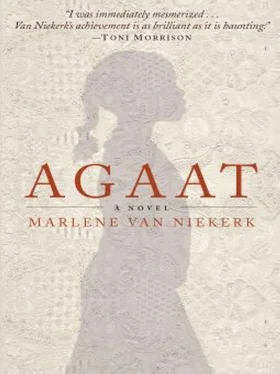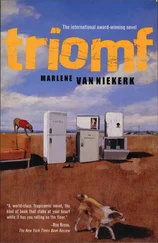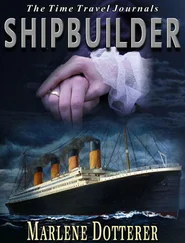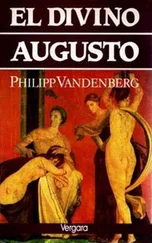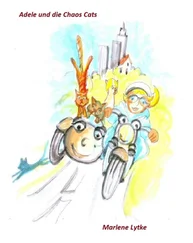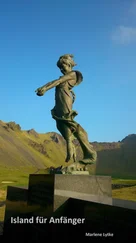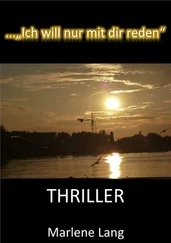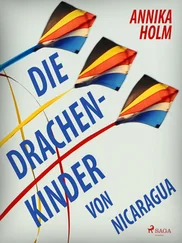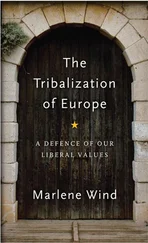Time flies, that’s what the shutting of the clock’s glass door means.
Clink, she puts the winding-key down behind the pediment of the clock.
Tchick, is her next sound.
It’s the sideboard’s dark little door. You can weep yourself blue, but your time you’ve had, is what it says.
Consider it well, says the shutting. Tchick.
Elegant symmetry, Agaat, that opening and shutting of yours in the front room. You can’t resist it. The emptying and the filling.
Time that streams away backwards, time that ticks on ahead, time being wound up for the running down.
There, behind the little blue books, lie the maps that I want to see.
And you may have dominion over my hours that you count off there and apportion with your devious little snake-hand and your white casque in front of the clock face, Agaat. But there is also space, cartographed, stippled, inalienable, the mountains, the valleys, the distance from A to B, laid down in place names for a century or two or three, Susverlore or Sogevonden, farms Foundlikethis or Lostlikethat.
Would she be able to see the sheaths, there where she’s bending over now? How many books would there still be blocking her view? There was a third pile. Of that we’ve read nothing yet. Would that be what’s blinding her?
With a mouth full of peppermint I lie here.
What am I supposed to do if I’m not allowed to cry? Crying is a last capacity in my depleted demesne. It’s something that can still come forth from me, something other than pee or poo or condensation. These three. She would want to measure and weigh them, absorb my sweat in a vapour-cloth, and store it in the cool-room. I can see it on her face when she removes my excretions. That I exude something tangible, has great persuasive force. Why then is she so indifferent to my tears? For them she would be able to develop a unique index. Salinity, sob-factor, specific gravity of grief. She would be able to taste, connoisseur that she is: The taste of guilt, the essence of almonds in my tears, and craving and confusion, tincture of eucalyptus, trace of fennel. Now is the time when she should be improvising with me, instead of nursing me singlemindedly, but she can’t grasp it. Once upon a time she could, but she taught herself not to. I taught her not to.
I listen to Agaat setting the rest of the day’s duties in train. She hands out orders in the kitchen. Her tone is authoritative, she speaks slowly and with emphasis. When she’s finished, there’s an immediate acceleration of activity. The screen door bangs. That would be Lietja going to fetch the cream and the milk for the house from the dairy, and the milk for Dawid’s clan, to put it in bottles in the big refrigerator till this evening. There, that’s the door of the small storeroom scraping open.
Do I remember the smell of fine chicken-meal? Can I count the steps from the backyard to the chicken run?
Agaat will go and feed the chicks, and then she’ll return and fill a few bottles from the milk left over in the buckets. She’ll feed the hanslammers, give them all a turn at the teat, for the smallest the longest, while she softly tells him or her everything.
Behind the drawn curtains I can hear the stoep furniture being moved. That is Saar. Tock, goes her broom, tock, tock, as she sweeps the corners of the stoep. Tock, tock, tock. There’s her face now in front of the chink, an oblique section of Saar, headscarf, many-coloured apron. Of the chink in the curtain, if she spots it, she takes no notice. Her gaze terminates against the little glass panes of the swing-door. I might as well not have been here.

Soil is everything, you said to Jak, healthy soil yields healthy animals and healthy people.
You were on the fallow land where OuKarel Okkenel and his son had harvested the previous November. It was your first March together on Grootmoedersdrift, 1948. You stepped on the spade, a chunk of the crust broke loose, you picked up a handful of soil, rubbed it, let it sift through your fingers. The fine grains that become slightly clayey in rainy weather, you’d known it from childhood, knew what it smelt like when it got wet.
It was ten o’clock in the morning. The sun was blazing down on your head. You’d with difficulty got Jak to accompany you. The previous day you’d had to negotiate with OuKarel.
You and your clan stay on on the farm, Karel, you said, I’ll pay you a wage, but we’re now going to sow ourselves.
Ai, Kleinnooi, OuKarel said. You saw how wrinkled he was. He stood there crumpling up his hat in front of him. I thought my Dawid-boy. .
You interrupted him. Dawid can stay on if he wants to work, oldster, you said, but I’m saying the sharing is over, we’re going to farm professionally here now, you plough in the wrong way, the soil washes away, we’re going to start ploughing with rippers on the contour.
You tried to explain the idea of the soil blanket to him, but he just stood there gaping at you.
You’ll get your rations same as always, end of the month, you said. He just nodded, put his hat back on.
Jak was the next one who had to be instructed in how things were going to be run.
I want to go and show you something, you said.
It had better be something big, he said from behind his motoring magazine.
It is, you said. It’s the beginning and the end of everything.
You loaded a spade and a pickaxe and a sieve into the bakkie. You wanted to teach him about soil, but he just stood there next to you on the land kicking at clods. You thought: How must I move you? Must I first till you here amongst the stubble? Will that make you listen to me?
That was what you thought, but what you said was: You really must help me to think here, my husband. Without you I can’t tackle this thing.
Don’t think you can bribe me with sweet talk, Jak muttered.
You kissed him on the mouth. He drew away slightly. He didn’t like kissing.
Look, you said, this is now the one type of dryland that you find here, shallow soil on shale. Tends towards acidic. Poor in phosphorus.
Jak shrugged. And?
And so lime supplements and superphosphate. And salt lick for the animals.
You’d brought along the ground-plan with illustrations. You’d made a thorough study, you thought he had to get on top of things. He wouldn’t touch the new publications on the agricultural development of the district, never mind listening to the extension officer. There on the land under the bright March sun you tried again. You stood close to him. You made sure that your hip was pressing against the small of his back. You showed him the photographs of the vertical sections.
Nine inches deep on the hills and then rock, you explained, it’s a pretty slender resource.
You’d noticed how meagre his knowledge was. His so-called diploma, he’d just seen to it that he enrolled, attended one or two classes, never even did the practicals. You had to teach him to sit on a tractor. A cow’s udder gave him the creeps.
You get yellowish and reddish shallow soil along the hills, you tried. Mispah and Glenrosa. Sometimes it stretches down a bit deeper. Down below on the slopes in the untilled veld it’s different, Hutton and Clovelly soils, medium-depth red and yellow solids that drain well. But up here where you can plough, it erodes easily, here we have to make good contours and run-offs.
You rocked lightly against his body, adjusted the rhythm to the pace of your instruction.
Jak stood behind you. He pressed his body against you.
He pointed over your shoulder at the grazing below in the direction of the river.
So here it’s dry and down there it’s wet, he said with a snigger.
Just so, Jakop, you said. You laughed at his innuendo while in truth you were irritated, you pressed back against him with your buttocks.
Читать дальше
